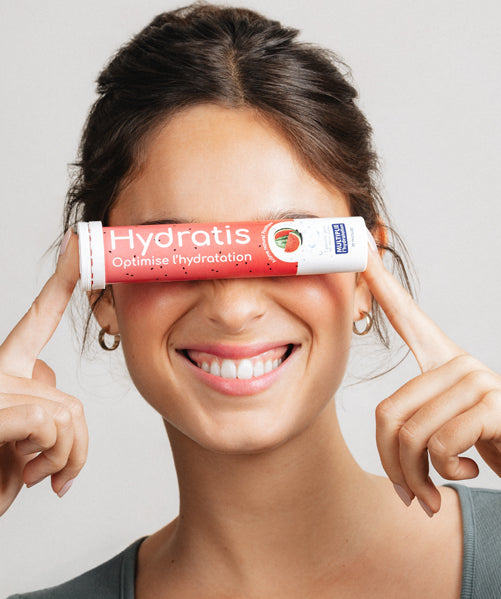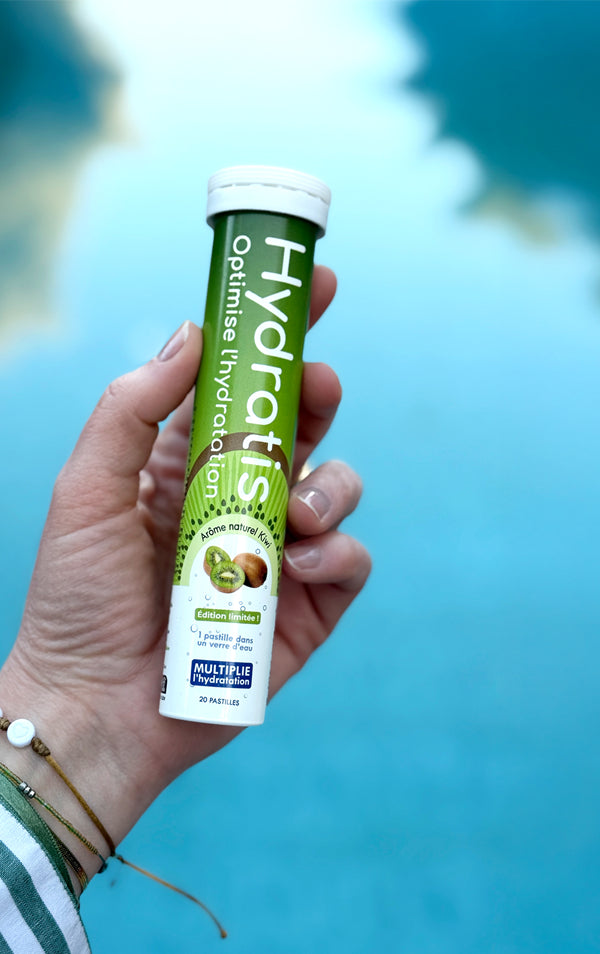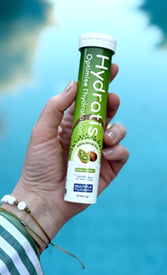Hydration is too often neglected in our daily lives, even though the consequences of dehydration are numerous. The proper functioning of your body depends on sufficient hydration . That's why not drinking enough water can be dangerous. In this article, we'll look at the signs and risks of dehydration and see how to avoid it!
1. Why is it essential to stay well hydrated?
Water is, of course, a vital element for our bodies. The resulting hydration allows the body to carry out a large number of essential processes. These include the elimination of waste through urine, the transport of nutrients by helping blood circulate more quickly, and the regulation of body temperature. Indeed, maintaining a constant temperature is important, which is why we sweat. Even more important is ensuring the proper functioning of our brain , as the brain is composed of approximately 73% water! For all these reasons, adequate hydration is crucial!
To give you a general idea, the EFSA (European Food Safety Authority) recommends that an adult drink approximately 1.6 to 2 liters of water per day. However, these figures obviously depend on your weight, the temperature, and your physical activity. The hotter it is and the more exercise you do, the greater the loss of water and electrolytes, which is why you need to drink more. To find out your ideal water intake, we recommend completing a quick questionnaire (maximum 2 minutes) on our website.
2. The 6 signs that you are not drinking enough water

When your water intake is insufficient, your body will let you know through various symptoms: first, you'll feel thirsty. This is indeed a sign of mild dehydration, so it's recommended to drink even before you feel thirsty to prevent it.
Next, if your urine is dark, this also means you are dehydrated. The same is true if you experience frequent headaches . Since the brain is sensitive to dehydration ( given its composition of 73% water) , a headache can develop quickly.
Fatigue is also a signal sent by the brain when you are not sufficiently hydrated. Indeed, insufficient hydration slows blood flow and reduces the supply of oxygen, essential to the muscles and brain, which can impair your concentration.
There are also more common symptoms such as cramps, dry skin, and constipation. If you experience any of these, it's essential to rehydrate quickly to prevent dehydration from worsening.
Hydration plays a major role in our health and neglecting it can cause a cascade of daily inconveniences and compromise our long-term health.
3. The health consequences of a lack of water
We have seen that a lack of water causes a number of symptoms, but what are the consequences for your body and your health?
3.1. Immediate effects
In the short term, dehydration will cause a loss of both physical and mental abilities; strength, endurance, reaction time, and even memory will be affected by this lack of hydration . Hydration is therefore essential for the proper functioning of the nervous system and plays a role in various important bodily processes.
Your digestion will also be affected, as water helps to thin it, and if there isn't enough, there's a risk of constipation or bloating. This is often the case after a bout of gastroenteritis with vomiting or diarrhea, for example. Furthermore, fluid loss causes dehydration, which can then lead to digestive problems.
Finally, as we have already mentioned, headaches are also a common consequence of dehydration. Insufficient water reduces oxygenation of the brain, which can cause pain, fatigue , or dizziness.
3.2. Long-term risks
In the long term, insufficient hydration can have significant health consequences. Frequent or prolonged dehydration weakens your kidneys and promotes the formation of kidney stones. Without sufficient water intake, minerals accumulate, thus facilitating the formation of these solid crystals.
It's important to know that skin and joints are particularly sensitive to dehydration. A decrease in body water reduces skin elasticity, accelerating the appearance of wrinkles and skin aging. Joints, which require optimal lubrication, are also affected. Similarly, insufficient hydration can lead to a decrease in synovial fluid, essential for joint lubrication, which increases the risk of pain and movement disorders.
Finally, water plays a vital role in eliminating toxins. Insufficient hydration will impair this function, compromising waste elimination and weakening the immune system.
4. Why don't some people drink enough water?

In most cases, dehydration is simply due to forgetting to drink. Whether in adults or children, busy days often make hydration a secondary concern, and people only drink when they feel thirsty.
Furthermore, the sensation of thirst varies from person to person. Some people rarely or never feel thirsty, leading them to drink insufficient fluids on a daily basis. This can be particularly pronounced in older people, as aging leads to a decrease in the sensation of thirst.
Another common cause of dehydration is the consumption of other beverages that may be more appealing but are less hydrating! Coffee, for example, is often perceived as sufficient for hydration, but it has a mild diuretic effect that can actually increase fluid loss. Similarly, sodas and alcohol, although widely consumed, contribute little to hydration and can even worsen dehydration due to their composition (sugar or alcohol).
Consumption habits, personal preferences, and lifestyle strongly influence daily fluid intake. Understanding these mechanisms allows us to better anticipate the risks of dehydration and adapt our habits to maintain adequate hydration levels.
5. How to easily increase your water consumption?
To address the causes of dehydration, here are some tips:
Having a bottle of water on hand: this will reduce the time it takes to hydrate and allow you to hydrate quickly if needed.
Add flavor to your water: you can add lemon, mint or fruits that you like, to enjoy in liquid form.
Use a water bottle with graduations: this will allow you to accurately track your water consumption.
Set reminders: in case you really forget to drink regularly!
In addition, consuming water-rich foods increases fluid intake effortlessly. For example, fruits and vegetables like cucumber, watermelon, and oranges are excellent sources of water. Dairy products like yogurt also contain a significant amount of water and provide valuable electrolytes. Therefore, adopting a balanced diet helps maintain good hydration levels.
If you're an athlete, it's important to stay hydrated before, during, and after exercise. Drinking beforehand helps anticipate fluid and electrolyte loss ; during exercise, to maintain your hydration level; and afterward to rehydrate and replenish lost electrolytes. Drinks containing sodium and other minerals are especially recommended after exercise for optimal recovery.
Finally, for those seeking a practical and enjoyable solution, there are hydration-optimizing tablets that dissolve in water. Hydratis offers tablets containing electrolytes and trace elements, which you dissolve in your water to provide all the minerals you need daily, namely sodium, potassium, magnesium, and chloride. In addition, the available flavors, such as lemon elderflower, coconut, or wild berries, will allow you to enjoy your drink and add a taste you love. So choose your favorite!

6. The benefits of regular hydration
Adopting a regular and controlled hydration routine has numerous health benefits. Your body will feel the effects! Drinking enough water improves blood circulation, which promotes better oxygen and nutrient delivery to vital organs. This translates into reduced fatigue and improved concentration.
The benefits don't stop there. Adequate hydration helps reduce joint and muscle pain. Water helps lubricate joints, improving their mobility and reducing discomfort, and it also aids in the elimination of toxins, which can reduce muscle tension.
Finally, regular hydration promotes healthy bowel movements. By increasing stool volume and softening it, water helps prevent constipation and ensures proper digestive function.
We have seen that the consequences of dehydration are numerous, and that they can be avoided! You can of course apply different solutions, the simplest being to remember to hydrate and rehydrate yourself by consuming drinks and foods rich in water and electrolytes.
Bibliography
Cheuvront, SN, & Kenefick, RW (2016). Am I Drinking Enough? Yes, No, and Maybe. In Journal of the American College of Nutrition (Vol. 35, Issue 2, pp. 185–192). Informa UK Limited. https://doi.org/10.1080/07315724.2015.1067872
Valtin, H. (2002). “Drink at least eight glasses of water a day.” Really? Is there scientific evidence for “8 × 8”? In American Journal of Physiology-Regulatory, Integrative and Comparative Physiology (Vol. 283, Issue 5, pp. R993–R1004). American Physiological Society. https://doi.org/10.1152/ajpregu.00365.2002
Cotter, J.D., Thornton, S.N., Lee, J.K., & Laursen, P.B. (2014). Are we being drowned in hydration advice? Thirty for more? In Extreme Physiology & Medicine (Vol. 3, Issue 1). Springer Science and Business Media LLC. https://doi.org/10.1186/2046-7648-3-18






